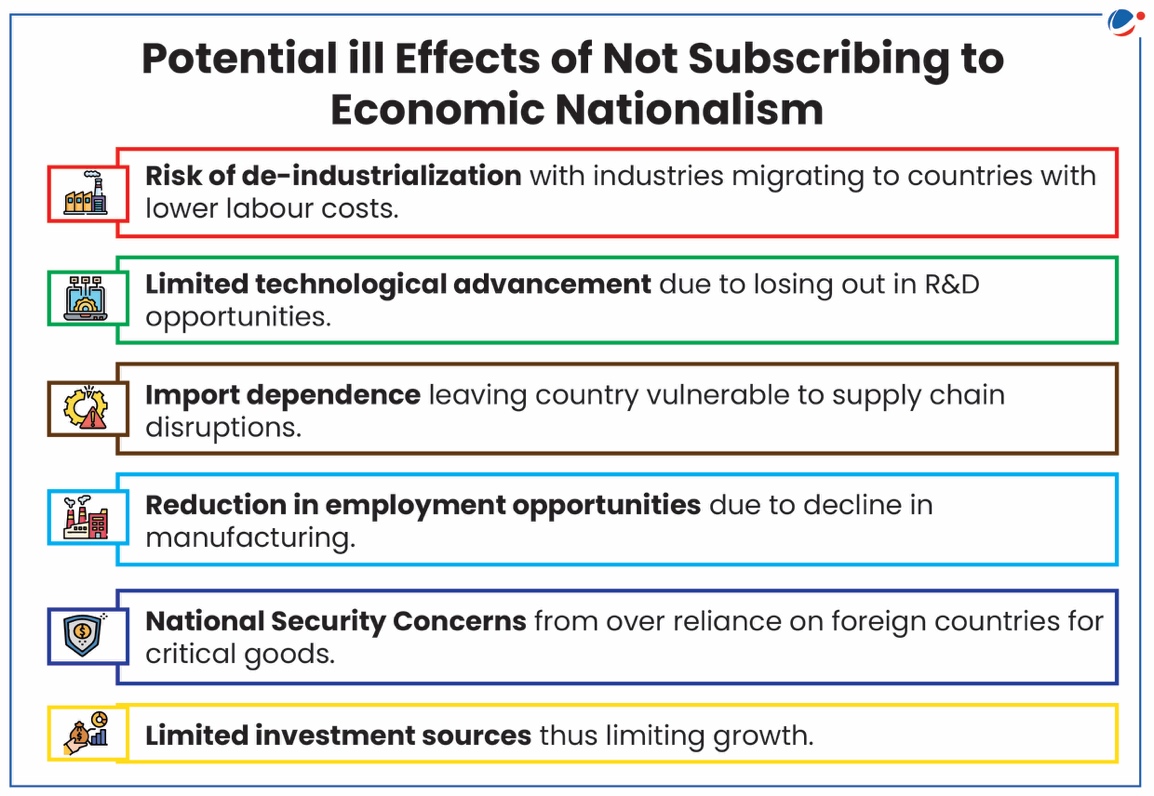Why in the news?
Vice President of India termed economic nationalism as quintessentially fundamental to India’s economic growth.
What is Economic Nationalism?
- Definition: Economic nationalism has been conventionally understood as the economic ideology which favours domestic control of the economy, labour and capital formation.
- Origin:Friedrich List is considered as the initiator of the concept of Economic Nationalism.
- List’s theory of ‘national economics’ differed from the doctrines of ‘individual economics’ and ‘cosmopolitan economics’ by Adam Smith and Jean-Baptiste Say respectively.
- List asserted that between the individual and entire humanity, stands the ‘Nation’ and he formulated his ideas on this intermediate agency – the Nation.
- List enquired how a nation can obtain prosperity, civilisation and power and his mechanism for this was industrial development. Thus, erecting tariff barriers to protect the infant industries became the basic aim of List’s economic policy.
- Changing nature: The present notion of economic nationalism is concerned with the nation and not with particular economic policies.
- It may adopt a variety of forms as it may advocate policies of economic liberalism or protectionist policies depending on the situation.

Economic Nationalism in India
- Development of idea: It developed in India within the context of its subordination to Britain (Colonial Rule).
- This was also associated with capitalist expansion on a world scale (first globalization) which was unequal in nature, consisting of the flow of manufactured commodities out of Europe and primary products into Europe.
- Early economic critiques of colonial rule: Cognition of the negative economic consequences of British colonial rule can be traced back to the 1830s in the writings of Raja Rammohan Roy.
- Later, certain intellectuals such as Bhaskar Pandurang Tarkhadkar, Govind Vitthal Kunte (popularly known as Bhau Mahajan) and Ramkrishna Vishwanath criticised the British rule for economically exploiting India.
- Emerging economic nationalist thought: During the late 19th century and early 20th century, economic critique widened to ‘political economy of nationhood’.
- Its most important proponents included Dadabhai Naoroji, Mahadev Govind Ranade, Romesh Chunder Dutt, Gopal Krishna Gokhale, G. Subramaniya Iyer, G.V. Joshi, Bal Gangadhar Tilak and Surendranath Banerjea.
- They realised that India was integrated within global capitalism in a subordinate position as a ‘dependent colonial economy’.
- They also criticized the processes of ‘ruralization’ and ‘de-industrialization’ to which India was subjected.
- Drain theory: Dadabhai Naoroji propounded the theory of ‘drain of wealth’ which was conceived as a unilateral transfer of resources from India to Britain without any corresponding economic and commercial gain.
These developments presented the case for developing independent national economic policies for the country.
Economic Nationalism creating Atmanirbhar Bharat
Since, independence, India has initiated several policies which can be understood as policies of Economic nationalism and contribute to the realization of Atmanirbhar Bharat.
- Promoting domestic industry: Several reforms initiated by the Government have the potential to promote the growth of domestic manufacturing and services industry.
- These include schemes such as Production-Linked Incentives (PLI) schemes, Make in India, National Infrastructure Pipeline, and Insolvency and Bankruptcy Code (IBC) etc.
- Other initiatives include Vocal for Local, One District One Product (ODOP) scheme, benefits to MSMEs etc.
- Participation in Global Supply Chain: India is undertaking ease-of-doing-business reforms, issuing quality control orders, and standardising products and services to enhance competitiveness, which will ensure its place in global supply chains.
- In this regard, initiatives for improving logistics such as Infrastructure development initiatives such as PM Gati Shakti National Master Plan, National Logistics Policy, Bharatmala and Sagarmala Pariyojana etc. will help in such integration.
- Strategic autonomy: India is building its capacity in strategic sectors such as defence, space, clean energy, digital services etc. and strengthening multilateral partnerships, which may reduce the impacts of geopolitics and help frame an independent foreign policy.
- Research and Development (R&D): Initiatives to promote R&D include the National Research Foundation, Uchhatar Avishkar Yojana (UAY), Impacting Research Innovation and Technology (IMPRINT) etc. These will make India technologically capable and self-reliant.
Conclusion
The decision to embrace or reject economic nationalism is not a binary one but is a situational decision. For India, the key is to find a balance between promoting domestic industries and remaining open to global trade.



